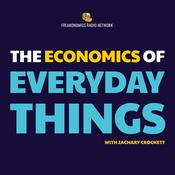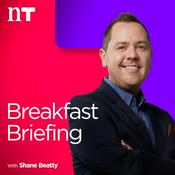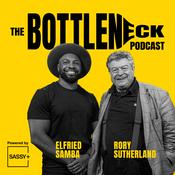122 episodes
- Neuro-Sustainability: Designing Places Where Brains Can Thrive
What if sustainability wasn’t only about carbon, materials, and energy — but also about the human brain?
In this second episode of the mini-series about neuro-sustainability, neuroscience and architecture meet in a conversation that feels both urgent and surprisingly practical.
We investigate the work of Cambridge scholarship student, Mohamed Hesham Khalil, which we believe should be integrated into planning and architecture around the world.
“We can change diet, can change habits, but we cannot change a built environment. It’s built once and it lasts for tens of years.” Mohamed Hesham Khalil
In this episode, he is joined by Burçin Ikiz, who brings a climate-and-health lens to brain wellbeing across the lifespan.
Mohamed Hesham Khalil brings a design-and-research lens focused on environmental enrichment — and what our homes, streets, workplaces, and neighbourhoods are doing to us every day, whether we notice it or not.
This is not a theoretical chat. It’s about how we design environments that help brains thrive — especially as heat, pollution, and chronic stress become part of daily life for millions.
Why this episode about neuro-sustainability matters
We like to think of brain health as something personal: sleep, diet, exercise, mindset. But the built environment is a long-term exposure — and it’s stubbornly permanent.
If your surroundings make movement hard, keep you indoors, overwhelm your senses, trap heat, or load the air with pollution — you don’t just “feel it.” Your brain does too.
What you’ll learn
1) What “environmental enrichment” means in the real world
This conversation translates neuroscience into design language: environments that support movement, stimulation, connection, and recovery.
“Don’t use it, you lose it. Just kind of like our muscles in our bodies.” Burçin Ikiz
2) The indoor reality we rarely talk about
If buildings are designed mainly for convenience and comfort, what happens to stimulation, mobility, and everyday brain engagement?
“When we spend like around 90 percent of time indoors… almost no chance for cognitive stimulation or physical activity through the building…” Mohamed Hesham Khalil
3) Heat, buildings, and brain function
As the climate warms, poorly adapted buildings become neurological stressors — not just uncomfortable boxes.
“If most of our buildings… have not been created for this increasingly warming world, it can be very, very hot indoors and that can really affect our brains.” Burçin Iki... - Welcome to the Constructive Voices’ mini-series that dives into neuro-sustainability and the built environment.
“The brain is not concrete… it is always changing.” Mohamed Hesham Khalil
We investigate the work of Cambridge scholarship student, Mohamed Hesham Khalil, which we believe should be integrated into planning and architecture around the world.
Mohamed also brings other top global experts to your ears during this short series of podcasts.
Neurosustainability and the built environment
What if sustainability isn’t complete unless it includes the brain?
In this opening episode, architect and Cambridge PhD candidate Mohammed Hesham Khalil introduces neurosustainability—a way of thinking about buildings and cities that asks how everyday environments shape mental health, cognition, stress levels, and long-term brain resilience.
“Sustainability… has to be inclusive and include the brain as well.” Mohammed Hesham Khalil
Jackie and Mohammed explore how the built environment influences us in ways we often overlook: the presence (or absence) of nature, whether our days include movement, how much variety and “spatial complexity” we experience, and how factors like air pollution can undermine health—even in places that look green on the surface.
This episode sets the foundation for the series: a practical, research-informed conversation about designing places that support the brain—not just the building.
Neurosustainability and the built environment
This episode is for anyone who makes decisions that shape how people live inside places—and anyone who’s felt, personally, that certain environments lift you up or drag you down.
“It’s not only about architecture… it’s about the way we live.” Mohamed Hesham Khalil
People who really need to listen
Architects & designers (especially if you care about wellbeing beyond “light and air” checklists)
Urban planners & transport planners working on walkability, density, public realm, and mobility
Developers & project managers making trade-offs between cost, space, green features,... - Rebuilding Ukraine through circularity, community with British and Dutch support, is a good news podcast episode.
This positive news story has been inspired by one of the world’s most tragic situations: the war in Ukraine.
“We in Ukraine are becoming a pilot site for diverse sustainable pilots, experiments and innovations. We have to leapfrog and build a society, buildings and processes that are inclusive, that are beautiful and that are sustainable. That’s our vision.” Roman Pushko
Rebuilding Ukraine safely, sustainably and swiftly – courtesy of S3RoU
A consortium of individuals, universities and entities in Ukraine, the United Kingdom and the Netherlands has come together to create a solution that will not only help rebuild Ukraine but could be used in other places that have been affected by wars or extreme weather events.
In layperson’s terms, rubble from the war in Ukraine will go through processes so it can be used to rebuild Ukraine swiftly, safely and sustainably. Discover more about the consortium who are involved in this rebuilding Ukraine project.
Rebuilding Uktraine S3 University of Leeds team
The conversation explores the innovative S3 project, which aims at sustainable reconstruction in Ukraine, focusing on the circular economy, community involvement, and the importance of decentralisation.
Experts discuss the challenges and opportunities presented by the project, emphasising the need for collaboration and inclusivity in rebuilding efforts. The discussion highlights the potential legacy of the project in shaping future construction practices and addressing the impacts of conflict and disaster.
“Concrete is made up of cement, sand, gravel and water – and we can theoretically get them all back. My vision is to decentralise it, prove it can work, and show people – through real demonstrations – that this is doable.” Professor Theodore Hanein
Rebuilding Ukraine S3RoU consortium
Who Should Listen?
This episode is for you if:
You’re a civil engineer, architect, urban planner or contractor interested in circular materials and real-world pilots.
You’re working on post-conflict or post-disaster reconstruction and want scalable, community-centred models.
You’re engaged in climate, energy or development policy and want to understand how embodied carbon and ci... Bringing Social Justice Messages to Your Community with Plan International Youth Representatives
02/12/2025 | 17 mins.In this episode, Ciara sits down with Jessica Gill and Aoibhínn Nevin-Ginnetty, two passionate youth advocates from Plan International Ireland’s Youth Advisory Panel who took their COP28 experience and turned it into local action.
Fresh from representing youth voices at COP28 in Dubai, Jessica and Aoibhínn came home determined not to let the momentum fade. Together, they designed and delivered “Feminist Voices for Climate Justice” – a youth-led Dublin event that combined a powerful panel discussion on gender and climate justice with a hands-on upcycling workshop, where attendees turned donated t-shirts into tote bags.
The result? A hopeful, practical space where young people could explore climate justice through a feminist lens, pick up real advocacy skills, and literally make something together. In this conversation, Jessica and Aoibhínn open up about what it really takes to organise a community-level climate event – the nerves, the logistics, the safeguarding, the storm on the day – and the joy of seeing people leave more confident and fired up than when they arrived.
In this episode about bringing Social Justice Messages to Your Community, we talk about:
From COP28 to community action
How attending COP28 as youth delegates with Plan International Ireland inspired Jessica and Aoibhínn to bring their learnings back to Irish communities – with a focus on the intersection of gender equality and the climate crisis.
Designing “Feminist Voices for Climate Justice”
Why they chose a gendered lens on climate justice, how they selected speakers, and what it was like to host the event at the Carmelite Community Centre in Dublin on 6 April 2024. Panelists included:
Vanessa Conroy – National Women’s Council, Feminist Communities for Climate Justice
Jennifer (Jenny) Salmon – Ireland’s climate youth delegate 2023–2024
Kiera Carney – host of The Book of Leaves podcast, bringing the arts and storytelling into climate conversations.
Making climate justice feel accessible
The importance of talking about everyday issues like rubbish on the beach, public transport or fast fashion, instead of always framing everything as “climate change” – and how that simple shift can invite more people into the conversation instead of scaring them off.
The tote bag workshop: climate action with scissors and string
How donated t-shirts from Change Clothes Crumlin became upcycled tote bags – and why a creative, hands-on activity helped break the ice, build connection, and give attendees a skill they could take home and repeat.
Behind the scenes of youth-led events
The very real challenges of organising a social justice event when you’re also studying, working and volunteering:
Safeguarding and risk assessm...COP30 Outcomes, the Amazon & the Rise of the Bioeconomy with Author, Tim Christophersen, VP Climate of Climate Change at Salesforce
24/11/2025 | 46 mins.In this episode of Constructive Voices, Jackie is joined again by Tim Christophersen, Vice President of Climate Action at Salesforce and author of Generation Restoration. Fresh back from COP30 in Belém, Tim shares why – out of roughly 15 COPs he has attended – this one felt like a genuine turning point for climate, nature, and the emerging bioeconomy.
"The Blue Zone in Belem: A long way to go, but the direction is clear!" Photo by Tim Christophersen
Drawing on decades of experience inside the UN system and now in the private sector, Tim takes us behind the headlines – beyond disappointment over the lack of fossil fuel phase-out language – into the real energy that’s building around solutions, especially in and around the Amazon.
He talks about dawn boat rides past parrots and agroforestry plots, industrial-scale ecosystem restoration on degraded pastureland, and the quiet revolution happening in food, finance, and cities. At the heart of it all is one simple shift: treating nature as core infrastructure, not decoration.
“For the first time at a COP, I had the feeling that the excitement about building something new is bigger than the anxiety about dismantling the old, extractive, unsustainable economy.” Tim Christophersen
Photo credit: Deposit Photos
COP30 Outcomes – Listen To The Podcast To Fully Understand
Why COP30 in Belém, Brazil, felt different from previous climate summits – and why Tim sees it as a pivot point rather than just “another COP”.
How Brazil used the location – right in the Amazon – to showcase a new kind of bioeconomy, from deforestation-free cattle to forest-based products and restoration concessions.
What the new long-term forest finance facilities, including the Tropical Forests Forever concept, could mean for paying countries to keep forests standing.
The rise of ecopreneurs and large-scale restoration projects turning degraded pasture into thriving forests – powered by carbon markets and better tech.
Why Tim believes the real story now is building something new, not just fighting the old fossil-fuel system.
How cities like Paris and Singapore are quietly proving that climate action can make daily life better – cleaner air, more green space, healthier people.
What it means to see food and regenerative agriculture as the frontline of the bioeconomy, from Amazonian superfoods to local, seasonal diets in Europ...
More Business podcasts
Trending Business podcasts
About Constructive Voices
Constructive Voices is an award-winning global platform that aims to break down silos in the built environment to accelerate positive change.
Through global conversations with change-makers, we inform our audience about some of the most important concepts and solutions of today.
The Constructive Voices team investigates topics such as green building, biodiversity, renewable energy, nature-positive solutions, AI, resilient building and more.
Hosts to date have included Jackie De Burca, Henry McDonald, Peter Finn, Steve Randall, Emma Nicholson and Sarah Austin.
Our vision is to partner with as many companies and individuals as possible to feature the positive work that they are doing. Making Constructive Voices the Go-To resource for global information and ideas on positive methods for a more sustainable built environment and world.
Our team is dedicated to exploring and promoting sustainability, biodiversity and innovation.
We talk to world-renowned experts, local people, businesses and students in our quest to document and inspire positive, historic changes required for these challenging times.
Podcast websiteListen to Constructive Voices, Boss Class from The Economist and many other podcasts from around the world with the radio.net app

Get the free radio.net app
- Stations and podcasts to bookmark
- Stream via Wi-Fi or Bluetooth
- Supports Carplay & Android Auto
- Many other app features
Get the free radio.net app
- Stations and podcasts to bookmark
- Stream via Wi-Fi or Bluetooth
- Supports Carplay & Android Auto
- Many other app features


Constructive Voices
Scan code,
download the app,
start listening.
download the app,
start listening.





































